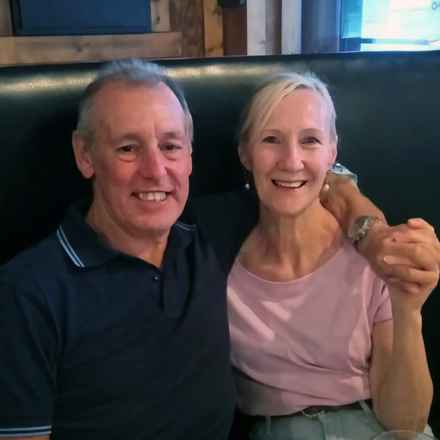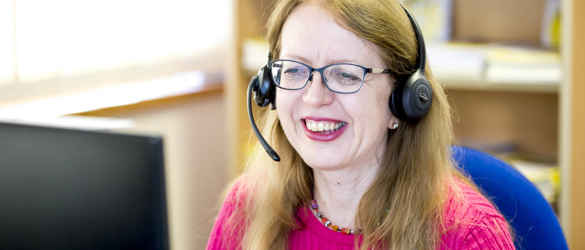"Without the Macular Society, I don’t know what we would’ve done"
Posted: Wednesday 24 July 2024
When Sue’s husband Peter was diagnosed with dry age-related macular degeneration (AMD), it wasn’t just his life that changed – it was hers too.
Together they faced an unknown future, with challenges they had never considered.
“We were shell shocked,” said Sue, who was wondering how she was going to be able to care for her husband now he was losing his sight. “We just felt abandoned and helpless. What are we going to do? We never spoke to a consultant at the hospital, so no one told us what to do, how bad it was, we got no help whatsoever.”
Looking 'normal'
Sue had found it difficult; to her, her husband “looked normal” and it took her time to come to terms with Peter’s deteriorating vision as he soon began to find he could no longer do online banking or see to pour himself a drink.
She said: “A very active, intelligent, clever guy that was just getting on with life and doing everything he wanted to do and then for him to change so suddenly, that was really quite heart-breaking.”
She added: “I think it took me a while to realise how bad his sight loss was. I found that really hard because he's not wearing glasses, he can't get any glasses that do anything for him. He looked normal. So it took me a little while.
“I never understood how it affects the central vision. It was frustrating at the beginning. I mean, I'm not a person that swears, but believe me, I've been swearing a lot recently.
“It's hard for me to tell him, 'Oh, no, you shouldn't be doing that. Don't do it like that’ but I don't want him to lose his independence because he always did everything for himself.”
Reaching out for support
As their thoughts and fears spiraled, it was Sue who eventually went to the doctors to ask for help, where she was put into touch with her local Eye Clinic Liaison Officer (ECLO).
She said: “I didn’t know they existed. She came out and chatted to me and she was absolutely amazing, simply because I could get a lot off my chest with her. She gave us loads of leaflets, one being the Macular Society, some being for our local sight support charity as well, and various other bits and pieces and advice on who to contact.”
Peter eventually contacted the Macular Society where the counselling service helped him to move forward with his own sight loss. “Without the Macular Society and Pete phoning them up I don’t know what we would’ve done,” said Sue. Peter has since gained confidence with technology, thanks to discovering text-to-talk apps and audiobooks.
Sue said: “I have to say that we are more positive about things because at first I was literally sitting with him and reading the BBC news to him and it was very tiring, exhausting. But now he can listen to that himself which is great. But I think technology has had a really impact on us in general.”
Peter has got a father-of-the-bride speech to learn for his daughter’s big day in October. As he struggles to read, the talking apps have helped.
Sue said: “He really, really wants to do it, but he just didn't think he could. But this is really helping him. That's just a great thing, because it's giving him something to do now.”
"Patience, tolerance and teamwork"
Offering her advice to others on a similar journey, Sue said it takes patience, tolerance and teamwork.
Sue said: “You just need a lot of patience, a lot of tolerance. You need to count to ten quite a lot as well, because both of you initially are both so frustrated and angry. Pete was very, very angry at first because of what had happened to him. He couldn't accept it.
“But I think it's also about teamwork. We have to do things together now more than we used to do before. And I think that's the important thing, is just to do that and just talk to each other about it, talk about how you are feeling. So that's what we have been doing.”
Friends and family counselling
Counselling is also available for friends and family of a loved one who has been diagnosed with macular disease. If you would like to be contacted about our counselling service please fill in our online counselling referral form or call our helpline on 0300 3030 111.
Free counselling and emotional support for sight loss
Are you dealing with the emotional challenges of macular disease? It can help to speak to a professional counsellor, who is trained to listen and to talk through your feelings and help you find ways of dealing with them. Use our free service today.
Macular Society Helpline
Free information and support to those with macular disease, along with their family and friends, to help people retain their independence.




